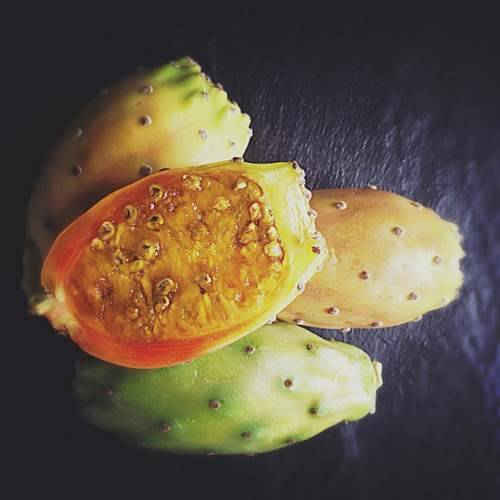Cactus
Cactus is best known as the prickly pear, a juicy plant of the spiny family, whose length varies from 1.5 to 3 meters. The stalks are transformed into leaf stalks that bear small leaves falling, and have plates or oars of gray-green color and covered with thorns and the fruit of the pulp covered with thorns. The odorless sweet taste grows in the spring.
Cactus grows in arid regions, and its origins originate in Mexico, as can be found in the United States, in the Mediterranean basin countries, in South Africa, in Australia, Kenya, and Angola, and because of its high drought tolerance, it is grown as a living fence and a repellent.
Cactus is also called spiny plants, such as the real Cactus belonging to the lily family, which are desert plants with a torso with leaves and fleshy textures containing Cactus. These plants grow in tropical forests and the Arabian Peninsula. The summer season is usually the season of the collection of leaves, and the drug has a good smell and patience taste of bitterness, and has many health benefits, such as treatment of skin diseases, sores, hemorrhoids, and has aesthetic and health benefits for hair, as it promotes the secretion of yellow, soften the intestines, and expel gases and drug For tuberculosis. Cactus is also called spiny plants, such as the real Cactus belonging to the lily family, which are desert plants with a torso with leaves and fleshy textures containing Cactus. These plants grow in tropical forests and the Arabian Peninsula. The summer season is usually the season of the collection of leaves, and the drug has a good smell and patience taste of bitterness, and has many health benefits, such as treatment of skin diseases, sores, hemorrhoids, and has aesthetic and health benefits for hair, as it promotes the secretion of yellow, soften the intestines, and expel gases and drug For tuberculosis.
Nutritional value of the cactus
Cactus fruits and stems contain glucose sugar, fructose sugar, ascorbic acid, fatty oil, a glue called tragacanth, calcium oxalate, tannins, colorants, the yeast that ferments the fruits, and the following table shows the nutritional value per 100 grams (Figs):
| Nutritional component | Nutritional value |
|---|---|
| Water | 87.55 g |
| Energy | 41 calories |
| Protein | 0.73 g |
| total fat | 0.51 grams |
| Carbohydrates | 9.57 g |
| Fibers | 3.6 g |
| Calcium | 56 milligrams |
| Iron | 0.3 milligrams |
| Magnesium | 85 milligrams |
| Phosphorus | 24 milligrams |
| Potassium | 220 mg |
| Sodium | 5 mg |
| Zinc | 0.12 milligrams |
| Vitamin C | 14 milligrams |
| Vitamin B1 (thiamine) | 0.014 mg |
| Vitamin B2 (Riboflavin) | 0.06 mg |
| Vitamin B3 (niacin) | 0.46 mg |
| Vitamin B6 | 0.060 milligrams |
| Folic acid | 6 mcg |
| Vitamin B12 | 0 mcg |
| Vitamin A | 43 IU |
Benefits of Cactus
To a plant Cactus Many benefits that led to its designation as the Sahara Pharmacy; Due to its high content of chemical compounds and nutrients that are used in many therapeutic and medicinal uses, the Pharaohs used the juice to treat dysmenorrhea, to soften the intestines, and to treat wounds, burns, and sores including eye ulcers.
- The immune system is enhanced because it contains anti-oxidant and anti-inflammatory compounds. One of the benefits of Cactus to the immune system is that it protects the body from the imbalance of free radicals and antioxidants, known as oxidative stress because it contains rare compounds called petals, which is a rich source.
- Enhances the work of the nervous system because it contains minerals and vitamins that promote hormonal balance, which enhances and balances the functions of the nervous system.
- Blood pressure is regulated because of its low salt content, especially sodium and potassium.
- It protects blood vessels from inflammation and treats inflamed blood vessels, where inflammation sites are suitable places for the accumulation and hardening of fats, and Cactus, in turn, contains compounds of petrol, polyphenols, and sugars proteins that act as antioxidants that reduce inflammation of the walls of blood vessels.
- Reduces levels of cholesterol and triglycerides in the blood because of its fiber and cholesterol content, which in turn interact with the bile in the small intestine, reducing the level of harmful triglycerides in the blood and lowering LDL cholesterol.
- It maintains and enhances liver function because it contains the antioxidant flavonoids, which fight free radicals and prevent them from affecting the liver and its functions. It also supports the fat absorption process and reduces the burden.
- It treats rheumatism, arthritis, and associated pain.
- Reduces blood sugar levels because of its low carbohydrate content, and contains dietary fiber and pectin, which in turn reduces the absorption of sugar in the stomach and intestines, and thus reduces the levels of sugar in the blood, and fiber gives a sense of fullness, which leads to reduce the proportion of food consumed.
- Organize and promote the work of the colon because it contains insoluble dietary fiber, which in turn facilitates the movement of food through the intestines, and prevents any digestive disorder, especially in the colon.
- Stomach ulcers are treated because they contain high amounts of gum, which in turn helps to balance the acidity of the stomach. Research has also shown that Cactus can treat stomach ulcers and reduce inflammation.
- It helps to lose weight indirectly because it contains insoluble dietary fiber, which gives a feeling of satiety, and reduces the amount of food consumed.
- It strengthens and supports hair growth because it contains amino acids, proteins, iron, and many nutrients and vitamins beneficial to the hair.
- Enhances male sexual ability because it contains a lot of amino acids, nutrients, vitamins, and minerals that improve blood circulation and relax the muscles surrounding the blood vessels connecting the penis, which leads to the expansion of blood vessels inside the penis, and increase the flow of blood, which leads to injury Penis enhancement.
- It treats the symptoms of alcoholism, such as headache, nausea, dry mouth, and loss of appetite because it contains chemical compounds made by a certain protein produced by the liver after the metabolism of alcohol that occurs in the liver.
side effects of the Cactus
Eating is considered fruit Cactus It is safe for most people, but can cause supplements that contain an extract Cactus A range of symptoms, including:
- Headache.
- Nausea.
- Bloating.
- diarrhea.
It can also cause the seeds in Cactus Disorders of the digestive system of some people such as constipation, although some people use Cactus
To treat cases of chronic diarrhea.










